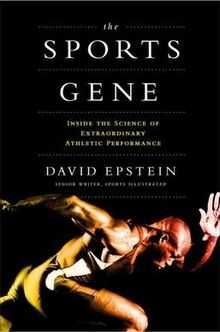The Sports Gene
 | |
| Author | David Epstein |
|---|---|
| Country | United States |
| Language | English |
| Genre | Sports |
| Published | August 2013, Penguin Books |
| Media type | Print (hardback) |
| Pages | 353 |
The Sports Gene is a book written by David Epstein, a senior writer for Sports Illustrated, on the effects of genetics and sports training on human athleticism. Through investigative journalism, Epstein takes the reader through his experiences regarding what makes the difference between an amateur and a pro-athlete. The book was published in August 2013 by Penguin Books.
Overview
This book explores the question of nature versus nurture as it pertains to training for athletes in sports using anecdotes which favor both sides of the argument. These anecdotes are combined with the results of statistical studies to give the reader an understanding of the magnitude that biology plays in athletics. Topics such as the effects of gender, race, genetics, culture, and physical environment are discussed as contributors to success in specific sports.
The chapters are:
- In Search of Sports Genes
- Beat by an Underhand Girl: The Gene-Free Model of Expertise
- A Tale of Two High Jumpers (Or: 10,000 Hours Plus or Minus 10,000 Hours)
- Major League Vision and the Greatest Child Athlete Sample Ever: The Hard and Software Paradigm
- Why Men Have Nipples
- The Talent of Trainability
- Superbaby, Bully Whippets, and the Trainability of Muscle
- The Big Bang of Body Types
- The Vitruvian NBA Player
- We Are All Black (Sort Of): Race and Genetic Diversity
- The Warrior-Slave Theory of Jamaican Sprinting
- Malaria and Muscle Fibers
- Can Every Kalenjin Run?
- The World's Greatest Accidental (Altitudinous) Talent Sieve
- Sled Dogs, Ultrarunners, and Couch Potato Genes
- The Heartbreak Gene: Death, Injury, and Pain on the Field
- The Gold Medal Mutation
- Epilogue: The Perfect Athlete
Criticism of the 10,000 hours rule
David Epstein criticizes ideas in sports such as the "10,000 hour rule" by providing a series of interviews with experts and results from studies. The 10,000 hour rule is the hypothesis that if a person practices a skill for 10,000 hours, they will become an expert or a master in the skill. Epstein looks into this hypothesis critically by comparing studies from master chess players to professional volleyball players to violinists to reach the conclusion that the 10,000 hour rule is merely am average and the actual range of hours needed for athletes to master a skill is fairly wide. He explores several cases of persons who were not well-trained in some sport but then performed surprisingly well when put to a test, and when given training quickly went on to win medals in for instance the Olympics
Race and sport
Epstein explores racial differences in sports performance and argues that on a genetic-level, persons of some African groups (such Jamaicans and Kalenjins) an advantage in some sports such as the 100 meters sprint. He explores the topic by use of interviews with experts and summarizing scientific studies.
Reception
The book has generally positive reviews on Amazon and Goodreads, with average ratings of 4.7/5 (309 ratings), and 5.15/5 (2827 ratings).[1][2] The official website lists a number of other positive reviews published in venues such as The New York Times, Science, and The Guardian.[3]
References
External links
- The Sports Gene official website.